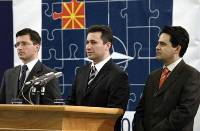Balkan heads of state focus on global energy crisis at summit in Macedonia
Balkan heads of state gather at a Macedonian resort town Friday to push collective energy security against a backdrop of growing power shortages.

The leaders were set to declare political solidarity in the event of a local or global energy crisis. The draft declaration, seen by The Associated Press, also reaffirms the Western Balkan states' intention to integrate more closely with European institutions including the EU.
It also calls energy stability crucial for economic development and political stability, and advocates transparency and market principles for suppliers and users.
The summit brings together six presidents Alfred Moisiu of Albania, Stipe Mesic of Croatia, Boris Tadic of Serbia, Filip Vujanovic of Montenegro, Branko Crvenkovski of host country Macedonia and Nebojsa Radmanovic, representing Bosnia-Herzegovina's rotating presidency along with Bulgaria's vice president, Angel Marin.
Romanian President Traian Basescu was a late cancellation because of impending impeachment hearings in Bucharest.
Macedonia chose to focus on energy instead of other recurring problems, like organized crime and corruption, when setting the agenda for the summit, said Stevo Pendarovski, foreign affairs adviser for the Macedonian presidency.
"For many years, we dealt with questions from the past. The feeling now is that Macedonia should initiate something new, not just follow the old Balkan agenda," he said Thursday.
Modernizing quickly, however, has been jeopardized by a looming energy shortfall more than a decade after the Dayton accords ended the bloody conflicts that followed Yugoslavia's breakup. Five of the six former Yugoslav republics are represented here, minus only Slovenia.
"We are facing serious problems in the energy field," Pendarovski said. "Our region is not rich with energy resources, we all import oil. We need a stable supply of sources and more use of renewable energies."
Ohrid, tucked in the southwestern corner of Macedonia, is an ancient town of mixed Orthodox, Slavic and Ottoman influence.
The summit is the Balkan leaders' third gathering in a year, following summits on tourism last year in Durres, Albania and combating terrorism and organized crime last October near Belgrade.
The region was hit by the EU-mandated closure on Jan. 1 of two reactors at Bulgaria's Kozloduy nuclear power plant. The safety-related shutdown drastically reduced electricity exports from Bulgaria, previously a major producer causing shortages in nearby countries and raising fears of more blackouts this summer.
Meanwhile, a winter drought has reduced hydroelectric production, while other planned infrastructure the Burgas-Alexandroupolis oil pipeline, the private AMBO oil link proposed between Bulgaria and Albania and a new Bulgarian nuclear plant are years from going online.
Macedonia is also pushing a privatization agenda.
"We would like to see less state intervention, and we are promoting initiatives in this area," including tenders for 60 small hydroelectric facilities, Pendarovski said.
"It is something, but it cannot solve the whole problem. We have to appeal to foreign companies" for investments, he said.
The meeting advances the aims of the Energy Community Treaty, signed in October 2005, which extends the EU's internal energy market into southeastern Europe to develop networks, balance supply and demand and promote efficiency. It is also seen as a precursor for future EU membership.
Two participating countries, Bulgaria and Romania, joined the EU in January. Croatia and Macedonia are official candidates, while membership prospects of the other four remain distant.
Subscribe to Pravda.Ru Telegram channel, Facebook, RSS!




